#Last Longer Pills Review
Explore tagged Tumblr posts
Text
Duratia 30mg is a trusted medication designed to effectively manage premature ejaculation, allowing you to regain control over your sexual performance. Each tablet contains dapoxetine hydrochloride, a selective serotonin reuptake inhibitor (SSRI) that prolongs the time to ejaculation. Take Duratia 30mg orally with water, approximately 1-3 hours before anticipated sexual activity, and experience enhanced satisfaction and confidence.
Order Now : https://bluepillexpress.shop/product/duratia-30mg/
#Premature ejaculation treatment#Duratia 30mg#Dapoxetine hydrochloride#Buy Duratia 30mg online#PE medication#Duratia 30mg reviews#How to last longer in bed#Order Duratia 30mg#Premature ejaculation pills#Duratia 30mg price
0 notes
Note
Have you seen “All The Boys Love Mandy Lane”? One of the characters, Emmet, definitely seems like a yandere

So I will preface this with the fact that I have no watched a lot of slasher or even horror movies before, so I'm pretty new to all of it. I do know the tropes from it though, which is sort of important for the twist in the story of All the Boys Love Mandy Lane. Though yes, I do think that Emmet is a yandere, he's just not very fleshed out within the movie/you need to make some connections to see it work.
The story starts out with Mandy walking through school with all guys eyeing her as she does. She is joined by her friend Emmet and invited to a pool party by a guy named Dylan. Mandy accepts but only if Emmet comes along and he agrees. During the party, a drunk Dylan comes up to Emmet who is sitting on the roof and starts talking about how he wants to bang Mandy. Emmet is able to convince him that jumping off the roof into the pool is a sure fire way to get her to like him and after some convincing, he does so. As he lands though, he ends up breaking his neck, dying in the pool. Nine months past and it seems that Emmet and Mandy are no longer as close as they were before. The three guys Red, Jake and Bird all talk about how they want to be the one to take Mandy's virginity. Chloe and Marlin convince Mandy to come on a road trip with them to Red's ranch while gossiping about how Emmet was the one who got Dylan killed, which is why he's shunned. They all head on the road trip to the cabin and eventually meet Garth, a guy who ends up protecting the group. Bird tries his hand at getting close to Mandy, managing to hold hands and kiss her on the cheek. Later that night, Merlin gives Jake a blowjob and upon leaving, the killer ends up sticking a gun in her mouth and breaking her jaw. As the night goes on, Jake who is drunk, ends up finding Merlin sitting next to a lake before he too is attacked by the killer. We find out that the killer is indeed Emmet, who has been obsessed with Mandy from the get go, having been shunned from the rest of his peers, he has a diary with obsessive scribbles about her. Eventually Bird runs out of the place, chasing after someone and finds himself face to face with Emmet. While he puts up a good fight, his face is eventually slashed by Emmet as he finishes him off. The remaining survivors realize that people have gone missing and start to barricading the house, though eventually, Garret tries to protect them and ends up getting shot. The other two, Red and Chloe attempt to run away, but find the body of Marlin and Jake near the fence. The two of them freak out before Red gets shot by Emmet. Chloe tries to hide next to some hay but finds the body of Bird there. She's able to run away and finds Mandy, however, Mandy ends up siding with Emmet and gets her killed with an axe. Mandy admits that he planned this all out and Emmet gives her pills to eat so they can have a suicide pact. Mandy changes her mind at the last moment and gets Garret to shoot Emmet. Emmet and Garret both get shot and Emmet chases Mandy inside a pit with decomposing dead cows. However, Mandy is able to take the upper hand and beats Emmet to death. She ends up driving away with an injured Garret.
So first of all, gotta say that this was a good movie for Halloween because boy was it a lot of killing. The general plot of it is that all the guys really want to sleep with Mandy because they want to claim her and relieve her of her virginity only to have Emmet end up killing everyone in the process. I don't actually know if this movie is good or not since the reviews seem pretty polarizing with some saying the movie is trash and some saying that it's really good, but I thought it was...okay? I think the twist at the end where the final girl (Mandy) was actually kind of masterminding everything and ends up killing Emmet, but unfortunately there's not a lot of explanation to it at all. Why did Mandy plan to get them all killed? I guess we can assume that it's because everyone kept on leering on her so this was a way to get them all killed or perhaps she developed a taste for it when Dylan jumped into the pool to kill himself. From what I can tell there's nothing that really indicates why she does it, so I can only speculate. What is interesting is that Mandy does actually end up saving Garret at the end even though she could have easily killed him (she nearly stabbed him). Emmet is pretty much the same, in where we do see that Emmet does like Mandy as shown by the notebook and possibly by seeing Emmet making Dylan jump off the roof. I think for him it was because he was shunned by everyone else (he states to Bird that he will be dead by the end of the day, seemingly not caring) and Mandy, his only friend shunned him as well. Still, we don't really know what it is because it's not necessarily clear why. Maybe he was mad that the other guys were leering at him, maybe he also found that killing Dylan was very fun for him, again this is something that's not explained. If this is the case, then he would be at least protective and jealous type of yandere, given he did kill off most of the cast. Once again though, we can only speculate on what he actually felt since it's not really explicitly said anywhere.
Overall, not a bad movie. I think it's a fun thing to watch, but it's not really anything that you'd want to watch for a yandere, unless you want to see the yandere just kill a bunch of people (and then getting killed by the love interest).
22 notes
·
View notes
Text
PSA
Hi there. You. Person who either suspects you have ADHD, or otherwise has a diagnosis but is struggling to find a provider.
DO NOT FUCKING TRUST THE COMPANY DONE FIRST.
Done First is a company that claims to help people with ADHD get help via Telehealth. I was even their patient for a short time, because doctors around me didn't want to diagnose me because I'm "too old" and I saw an ad and signed up out of desperation (don't do this, kids!)
I was able to get a diagnosis an a prescription, but it was nothing but trouble.
They fucked up my scheduled appointment time the first time, and tried to charge me a $100 rescheduling fee until I pitched a fit that I was ON TIME for what I was slated for
I got like 5 minutes with my provider when I was finally able to get a goddamned appointment and I didn't feel listened to one bit
Suddenly, out of the blue, my provider left the company, which left me unable to get my prescription refilled
They flat out never answered ANY of the many emails and messages I sent, despite giving a 24-72 hour turnaround time to get an answer.
They have no call-in number, so I was not able to actually get a hold of anyone that way
I attempted on multiple occasions to schedule a callback but they ghosted me every single time.
Based on reviews from other patients over the last few days, you can no longer even TRY to schedule a callback from them, or if you can it's over a week in the future.
I ended up doing a chargeback on my card because they never actually provided me care beyond basically leaving me to go through Adderall withdrawals because they can't be fucked to communicate.
But it gets worse.
SERIOUS legal charges have been filed against the founders of Done First.
TL;DR: Done First basically operated as a pill mill while not actually giving two shits about the patients under their care, exploiting patients and doctors alike.
As of today, their website is still up, and they will still GLADLY take your money for a subscription despite them seeming to have NO appointments available to talk to anyone on their "Care Team" (more like They-Don't-Care-Team, amiright guys?)
They have this message on their site as of right now, and claim they're still here to help but please, PLEASE trust me when I say they will not help you.

Done First will steal your money.
Done First will not help you.
Done First is a greedy, scummy scam of a company and they do not deserve your trust.
Don't be stupid like I was. I didn't do my due diligence because I was desperate for care, and I ignored a lot of red flags that in hindsight should've been too obvious.
based on other reviews on places like Reddit and Trust Pilot, they are also just no longer filling any prescriptions so thousands of users are left without vital medication and facing the prospect of being taken off vital meds cold-turkey.
I was fortunately able to get actual medical care that is able to get me the medication I need to live a better life, and an actual ADHD diagnosis that will, I hope, help me navigate life better.
My heart hurts so badly for all those left in the lurch because this company fucked up so badly. Whether it's people with ADHD who need care, or addicts who have suddenly lost a relatively safe avenue to get their drug of choice, NOBODY DESERVES TO GO THROUGH THE PAIN AND SUFFERING AND WITHDRAWALS THIS COMPANY IS CAUSING.
Anyway, I never usually ask this, but if you read this far please either reblog or share this post link with others. You and your loved ones deserve better than this scam.
#done first#done first ADHD#adhd#actually adhd#sunny rants#please reblog#urgent#psa#please share#friends don't let friends use Done First
28 notes
·
View notes
Note
Hello Haitch! Hope you are doing well.
Last year during summer, I was diagnosed with PCOS (i had gotten it checked because i hadnt had my period in like 3 months) and since i was just 17, the doctor asked me to maintain a proper lifestyle and see till November and said that if it wasnt fixed by then, i had to do a checkup again. But i'd gotten my period by august so i never reached out again.
but this year (im 18 now), the last time id gotten my period was in april so it's been 6 months now. im gonna go to the doctor again later this month. but here's the thing— last year, i went to a gyno abroad because women's healthcare isnt the best in my country. but this year, its not possible for me to go abroad right now so im gonna have to work with a gyno from here.
now i have a feeling that theyll put me on pills and while i agree thats the easy way to fix this, im worried itll mess things up for the long run. the lifestyle the first gyno asked me to follow is a little difficult for me to get into since she'd asked me to exercise plenty and im a full time alevel student and it gets hard for me to maintain a proper routine like that. i also struggle with binge eating which i've heard comes with having pcos (im not sure if this is true tho).
so in one hand, i feel like it's easier to just start taking pills but then again it has so many side effects i don't know what to do right now.
Lots to unpack here.
CW/TW: PCOS, medical discussion, endocrine disorders, diabetes, hypothyroidism, weight management, medication management
Firstly, PCOS is often diagnosed based on vague criteria; lots of doctors flippantly diagnose it based on a volume of loose criteria. If you have an increasing number of these criteria, then yes, the chances are you have PCOS. However, it's often erroneously diagnosed without proper diagnostic procedures such as scans, bloods, and a full review of your longer term health history.
That being said, being on the pill doesn't 'cure' PCOS, it can simply manage the symptom of irregular periods. There's flimsy evidence on the pill's ability to manage/prevent weight gain and the development of other disorders that are associated with PCOS.
While weight loss is often harder for women with PCOS, especially if you have associated conditions such as an under active thyroid, it's not impossible.
Your lifetime chances of developing Diabetes are significantly higher with PCOS, and this chance goes up again if you struggle with increased body weight. PCOS and appetite changes like binge eating have been associated with each other, too.
So you'll only know if managing your weight and eating habits make a difference with your PCOS, when you've actually tried them to the absolute best of your ability. If you are at an increased ideal weight, losing weight can be very effective to manage and reduce the symptoms of PCOS.
Of the many, many thousands of women I've looked after, I'm sorry to say that those with PCOS who are very pro-active with managing their weight, perhaps taking medications as advised by their doctor (the pill and Metformin are the most common ones I see), and exercising regularly, are those who have the highest chance of being 'healthy' (though I do not use the term 'healthy' lightly).
Ultimately, PCOS is one of those things that just happens and isn't your fault. I also have an endocrine disorder that makes it very easy for me to gain weight and very difficult for me to lose it, so I absolutely understand the situation yours in right now.
But, what do you do with this information? Do you say, "I am X, Y and Z because of my PCOS" and leave it at that? Or do you say "I suffer with X, Y and Z because of my PCOS, so I make life choices to reduce the impact of my PCOS by 1, 2 and 3".
So my advice is this: PCOS may be the hand you've been dealt, but your lifestyle choices can massively improve the chances of you reducing its impact on your long-term health. I'm not blaming you, or acting like healthy eating, exercise and medication decisions are easy; they are not. Please recall I'm in a similar boat, and I'm not one to blame women for their complex health conditions.
I could talk all day about PCOS but this is my best attempt to summarise it for you.
It's really hard making tough life choices to manage the hand you've been dealt. I fully understand. I've gotten better at it as I've gotten older. @mrhaitch makes similar big decisions, because he has two diabetic parents and one diabetic siblings, so he takes care of his health to a brilliant degree, to try to give himself the best chance of not developing diabetes himself.

☝️ me being your hype man
Love,
-- Haitch xxx
10 notes
·
View notes
Text
Kinda sad that I am now reduced to buying clothing by catalog/website.
I've resisted going this route for such a long time because I need to feel the fabric and check the fit, especially the fit because so much of what I try on in stores fits like absolute shit.
But... fml.
The sorta bad state of clothing 10 years ago in stores has degraded. Even high end brands are absolute shit. I'm damn thankful I no longer need office/professional clothing bc when I last went to The Correct Sort of Mall and Department Store for such things, I was horrified. Brands I had worn in the past when I needed to "dress up" for pro reasons had drastically cheapened their quality while keeping their prices high.
Cheap stuff now is just trash. Wash once at it is a pilled mess or misshapen rag.
Even sportswear brands that are not known for being affordable have all turned into overpriced fast fashion.
Well.... at least LL Bean still has 100% cotton T-shirts in a variety of colors. Time to put in an order via their website and hope the reviews are valid.
Other than that, need to wait til my next flight out of North America (somewhat soonish) to purchase actual clothing that is designed to be worn more than once.
16 notes
·
View notes
Text
Best Friends: Arrow 1x19 Review (Unfinished Business)
“Unfinished Business” takes a hard look at Oliver’s friendships with Tommy and Diggle, as one relationship crumbles and the other finds stronger footing – after a few missteps.
Prepare yourselves. I might write about the flashbacks this week because Shado provided an information download which was sorely needed.
Let’s dig in…
Oliver and Tommy
Oliver revealed his true identity to Tommy three episodes ago and it feels like their friendship has been a bomb waiting to explode ever since. A girl who partied at Verdant dies from a Vertigo overdose, which puts Quentin hot on Tommy’s trail and Oliver hot on The Count’s. This poor girl sadly is the catalyst for the explosion between Tommy and Oliver we’ve been waiting for.

The “evidence” that convinces Quentin Tommy is dealing Vertigo isn’t exactly irrefutable. The girl texted Tommy before she died, which Tommy easily explains because he receives texts from hundreds of people every night trying to get into the club. Her request for a “hook up” is not for Vertigo as Quentin believes.
The second piece of evidence raises the eyebrows, but Tommy has an explanation – albeit a shady one. There is ten thousand dollars missing from Verdant’s operating budget. Quentin believes Tommy used it to buy Vertigo, but he used it to bribe the zoning commissioner into skipping their inspection. Bribery isn’t great, but it’s a far lesser crime than dealing a deadly drug. L*urel could drive a truck through all that room for reasonable doubt.

This episode is another Merlance highpoint. L*urel believed in Tommy one hundred percent and he called her baby. Just leave me to my grave to die a happy woman.

After Tommy refuses Quentin entry into Verdant without a warrant, the detective comes back with one and it leads to a heart stopping moment. He wants to specifically look at the sub level not listed on the inspection’s floor plans. Ever the dutiful detective, Lance pulled the county records and knows it exists.

In my mind, I know this is not the way Oliver’s vigilante hideaway is getting discovered, but the panic in Oliver’s eyes always sends me to Stressville USA. Especially when he types the code!!! He’s shooting those panicked looks at Tommy who is as cool as a cucumber.
Quentin enters the The Hood's bunker and there’s no bunker! How Tommy moved all that equipment and replaced it with bottles of booze I will never understand. We simply have to believe in the magic of television y’all. Tommy is not going to rat Oliver out and he quite literally saves his ass.
Something Oliver should have known, but his lack of faith in Tommy is evident. It’s something Tommy cannot tolerate, not after everything that’s happened between them. He cannot believe Oliver thought he was dealing drugs out of the club.
Oliver doesn’t understand why Tommy wasn’t honest about the bribe. Oliver loses me right off the bat. Team Tommy all the way. Let’s list out the things you have not told Tommy, Oliver and we’ll see who has the longer list. YOU HID YOUR SECRET SUPERHERO LAIR IN THE CLUB YOU OPENED WITH TOMMY AND NEVER TOLD HIM ABOUT IT. A bribe is chump change in comparison to that lie.
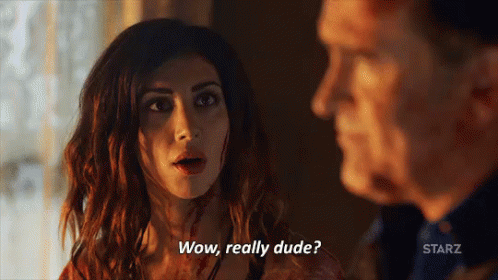
Tommy: Let me ask you a question, pal. What have I done in the last six months since you’ve been home that would lead you to believe that I would sell drugs?
Oliver: In the last six months? Nothing. But before I left you played hard. You played with bad people who were into bad stuff.
Tommy: So, did you Oliver. But I changed just like you did. Now you put arrows in people who do bad things.
Oliver gets owned in this argument, because Tommy is right. He refuses to see that Tommy has truly changed, but still expects Tommy to understand he has.
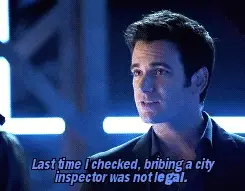
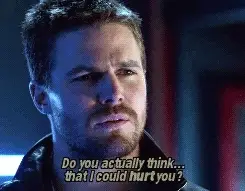
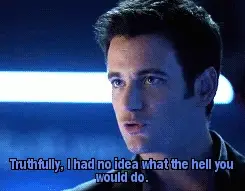

Source: @htbthomas
Oliver’s changes are a tougher pill to swallow. Tommy cannot understand how Oliver can kill people so easily and, quite frankly, wasn’t one hundred percent sure he wouldn’t end up with an arrow in him if he told Oliver about the bribe.
Is this insane for Tommy to be wondering? No, I don’t think so. We know Oliver doesn’t kill easily. We know he’s fighting a nightly war and there is a steep cost to this mission.
However, Oliver has not opened up to Tommy about what happened the five years he was away and he’s not Mr. Joe Here’s What I’m Thinking about being The Hood today. Killing is something Tommy cannot understand, but Oliver expects him to accept it with little to no explanation. Then he has the nerve not to trust Tommy? Seriously?

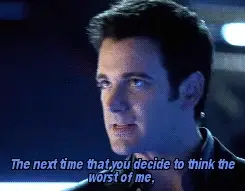


Source: @htbthomas
What Tommy thinks of him is a verbal gut punch to Oliver, but he deserved it. Unfortunately, this fight is not one Oliver can fix with a simple apology. Tommy has reached his limit and who can blame him.


Tommy: This club is important to me, but to you it’s just a front. You want me to keep your secret, help you be this thing you’ve become, but you refuse to see me for what I’ve become. I’ve got just a bit too much self-respect for that. I quit.

BOOM. YASSS MY SON!!! Way to stand up for yourself Thomas. I was so proud of him telling Oliver where to stick it.
Tommy: I’d prefer we skip the I-told-you-so’s, but the nightclub wasn’t really working out. I guess I need something more boring, stable… I guess what I’m saying is - I need a job.

TOMMY WHAT ARE YOU DOING??!!! WORST. DECISION. EVER.
Tommy is back in the arms of the Big Bad Malcom Merlyn. For one brief shining moment, Tommy stood tall on the moral high ground, but not five seconds later comes plummeting back down to work with the sludge of the earth.

Source: @fogsblue
Tommy has every right to be pissed at Oliver, but his father is not the answer. That man is a hellscape. Whatever positive changes Tommy has made he is in real danger of a serious backslide. Now that Tommy is on the outs with Oliver, Merlyn can lead his son right to his very own villain origin story. And Tommy may lose sight of who he really is.
Oliver and Diggle (Felicity)
Oliver is firing on all cylinders tonight with his bros. After accusing his best friend of being a drug dealer, Oliver pitches a hissy fit over Diggle not being available the second he’s needed.
John is distracted because he’s consumed with avenging his brother’s death and killing Deadshot. While Oliver was trying to stop a hostage situation with a man high on Vertigo, Diggle was handing over information on Deadshot to a friend from ARGUS.

Hello Lyla! This is her very first Arrow appearance. These two had more chemistry in this single scene than any scene with Diggle and Carly. I don’t know what obsession this show has about siblings dating the same people, but it’s enough already. I have to deal with this crap on The Vampire Diaries.
Oliver is furious Diggle ignored Felicity’s phone call. John hilariously tells Oliver not to get his panties in a twist. He’s completely fine. Oliver pretty much puts his hands on his hips and says, “You couldn’t have known that!” They sound like an old married couple.
John is a little put out Oliver is not more understanding. He thought Oliver would understand his vendetta against Deadshot, since Oliver is walking around with a whole damn list of names from his father! But that’s right. It’s a mission. Not a vendetta. Where’s Helena? We need her around if we’re debating this again.
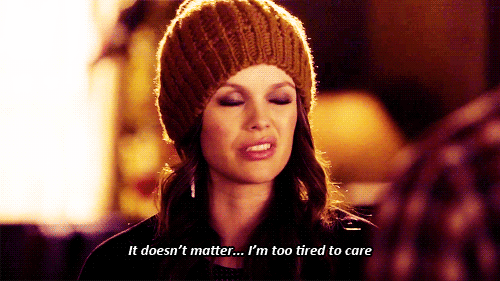
Diggle chooses to be more specific and reminds Oliver The Count almost killed Thea, so his fervor over getting this drug and criminal off the streets may be a little personal too. Oliver says nothing because it’s true.
Diggle: I can’t move on with my life knowing that he’s still out there. I thought if anybody got that it’d be you.
Oliver doesn’t say anything here either because that’s true too. #TeamDiggle.
Felicity and Oliver discover there’s a new antipsychotic drug added to Vertigo, which makes Oliver believe The Count didn’t break out of the asylum like he thought. Maybe he faked his escape like he faked the crazy.
Close, but no. The Count really is three paper plates short of a picnic. It’s his DOCTOR and a very burly orderly who are manufacturing Vertigo. Honestly, I did not see that one coming.
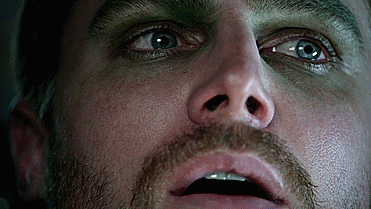
It’s a Vertigo episode, so Oliver is getting drugged, but this time Diggle does show up to save him. He takes out the horse sized orderly, and Oliver kills the doctor with three arrows. It’s not often The Hood requires more than one to get the job done, but his vision was a bit wonky, so he used three just to be on the safe side.
Both the orderly and the doctor had to die because they knew Oliver Queen was The Hood. Those are the rules. The interesting choice Oliver made was not to kill the Count, who is babbling like a toddler on a telephone.
Arrow uses this moment to draw a very important distinction between Diggle and Tommy. After the boys return home, Oliver wants to know if Diggle is ok. He’s the killer in this family, not John.
Diggle: I’ve killed before Oliver. It’s just been a while.
There is no judgment from either man. It’s just quiet acknowledgement that killing is necessary sometimes. But that doesn’t make it easy.
Tommy’s anger towards Oliver makes him blind to his humanity. Oliver is not a psychopath. He does not kill for the enjoyment of it. He is doing what is necessary to save the city from some really bad people. Tommy takes it too far believing killing is easy for Oliver. He’s furious Oliver doesn’t see the change in him, but the truth is Tommy doesn’t see the change in Oliver either.
This is something Oliver never had to explain to Diggle. John does see the change in Oliver. He stood by quietly as Oliver grappled with killing The Count. Diggle didn’t make any speeches. He simply left space for Oliver to make that decision on his own.
If Oliver chose to kill The Count, John would’ve understood that choice as well. He wouldn’t call him a murderer. John encourages Oliver to make different choices, but he also meets Oliver where he’s at. Maybe Oliver would open up more to Tommy if he offered less judgment like John Diggle.
Diggle is curious why Oliver didn’t kill The Count and he tells him the truth. There just didn’t seem to be a point with the Count chained up and lost to madness.
There are two things Oliver is not saying. He was convinced earlier in the episode that he made the wrong decision allowing The Count to live and was just a teensy bit mad.

Source: @lucyyh
But he couldn’t fire the arrow in the end.
Felicity’s gentle reassurance that locking The Count up was the right call hit her intended mark. If killing is truly a last resort, then Oliver has to utilize other methods of dealing with criminals. Oliver has shown more restraint ever since Felicity joined the team. He hasn’t stopped killing, but he does listen to her.

Source: @lucyyh
The second is Oliver believes killing an unarmed man in that condition would be wrong – like stabbing someone in the back. He’s not a threat in that condition and The Count truly didn’t have anything to do with the Vertigo being unleashed on the city again. There are rules to war and those rules keep his humanity intact.
John Diggle has Oliver’s back, so in return Oliver will have his and is making Deadshot a top priority. Couldn’t we have just done that from the beginning and skipped their couples fight?
Neither Oliver or Tommy can see the other for who they truly are. Yet, people Oliver met barely a year ago have more faith in him than his childhood best friend and vice versus. Sometimes history stops us from allowing change in the people we love.
You can see why Oliver is keeping his identity secret from his family and L*urel. It's not just about their safety. He's afraid they will all react like Tommy.
But there's no baggage with Diggle and Felicity, so Oliver has a clean slate. They can see Oliver for who he truly is. It's becoming clearer with every episode that Diggle (and Felicity) are Oliver's best friends.
Shado
Like Felicity, Shado is a breath of fresh air to Team Island. She is beautiful, kicks ass and knows a thing or two about a bow. Oliver has been helpless majority of the time. I am not expecting him to become a super secret agent man like Slade Wilson in a couple of months, but he does need to perform a function on this team other than dead weight.

Shado takes it upon herself to teach Oliver how to shoot, but she does not start with the bow. She begins by telling Oliver to slap a bowl of water. Like the idiotic American he is, Oliver is annoyed, but doesn’t really have anything better to do, so he slaps the water in the bowl. By episode end, his hand is strong enough to pull the bow string. This woman accomplished more in a day than Slade Wilson did in months.
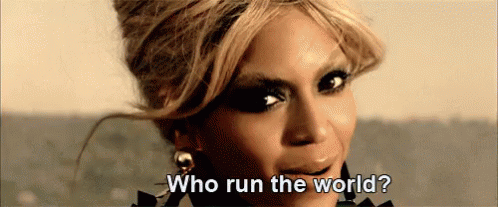
She also provides some much-needed Yao Fei backstory. He was general in the People’s Liberation Army (the Chinese communist army). The military committed a massacre and chose Yao Fei to take the blame. They sent him to Lian Yu for the rest of his life. Fryers knows this and wants Yao Fei to take the fall for whatever he’s going to do.
And we thought The Count was nuts.

Source: thearrowgifs
As for Shado, she spent years searching for her father. A man told her he knew where Yao Fei was, but kidnapped her instead and brought her to Lian Yu as leverage over Yao Fei. It took nineteen episodes to get that information. Yeesh.
Shado: I’m worried, this island, what he must have had to do to survive. That it changed him.
If this sounds ominous it’s supposed to. Not all change is good. That’s true for all of us - even Oliver Queen.
Stray Thoughts
“You could’ve just said he was nuts.” I like sassy Quentin.
Maybe it’s my whole Buffy history, but Shado and Slade sparring felt very sexually charged.
Budget cuts and the CAMERAS are the first to go in jail?!!!
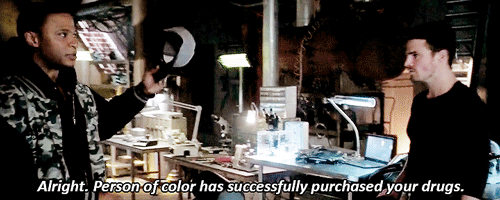
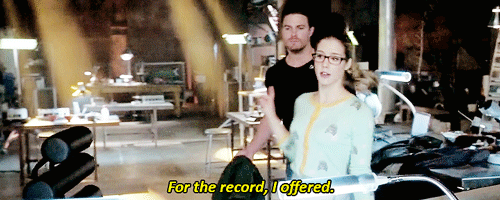
This will always be one of Diggle's best lines.
TOMMY HAS FELICITY’S PHONE NUMBER. Oh, the fics this detail launched.
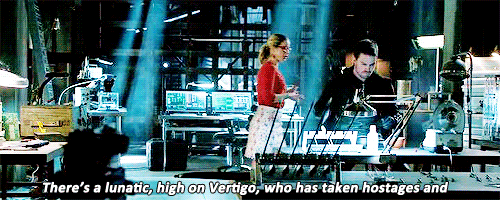

What did we ever do in the bunker without this perfect gumdrop of a human being?
“What’s happening now isn’t your fault.” Felicity should’ve tattooed this on Oliver’s arm. It would save a whole lot of time.
“My mom does yoga.” Ollie is just so… Ollie.
1141 is the passcode to the bunker. The Green Arrow was created November 1941 (11/41).
Listen to the Watchover podcast reaction to 1x19!!!
If you’d like to support the blog, please buy me a cup of tea!
Disclaimer: Any gifs on the blog are not mine. If you would like a gif removed from my reviews, please message me
#arrow#arrow 1x19#arrow review#arrow reviews#olicity#oliver and diggle#oliver and felicity#ota#original team arrow#tommy merlyn#oliver and tommy#anti laurel lance#merlance#arrow season 1#arrow rewatch#olicity fandom#arrow fandom#season 1 episode review#season 1 episode reviews#lyla michaels#dyla#malcolm merlyn
20 notes
·
View notes
Text

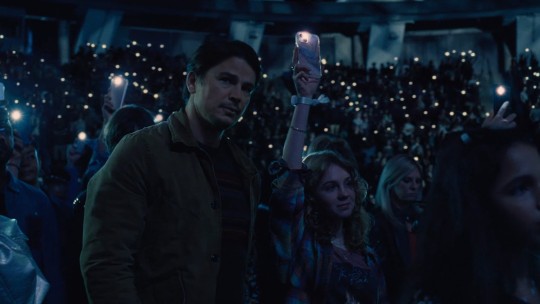

2024 Horror Challenge: [28/?]
↳“I think you're looking for me.” Trap (2024) dir. M. Night Shyamalan
Plot: A father and his teen daughter attend a pop concert only to realize they've entered the center of a dark and sinister event.
Starring: Josh Hartnett, Ariel Donoghue, Saleka Night Shyamalan, Hayley Mills & Alison Pill (and featuring Kid Cudi & Russ)
Last catchup review for the day (even tho I definitely have other horror movies I watched lately) since these were the big four that I wanted to type up on here. I saved this review for last because I actually went to go see this one in the theater. Yeah, a M. Night movie, me, in the year 2024. Who would have thought? Mostly because as I previously stated in my reviews of Old, Knock at the Cabin & The Visit (and his daughter's The Watchers), my track record with him is, quite frankly, not the best. lol But hey, I love Signs. I was mildly amused by The Visit. Split, while problematic, is pretty entertaining imo. And I've actually never properly watched The Sixth Sense in its entirety (I already knew the plot twist so lol) but hey, that's considered a classic. So, I don't hate M. Night. Just not all of his movies are my cup of tea BUT I was actually pretty excited for this one. The premise intrigued me, despite there not seeming much elsewhere for the story to go based on the trailer. And a chance to see Josh Harnett as a villain, hello??? Sign me up! Also, I just really love the idea of a horror movie at a concert. Now, while I didn't hate this... I gotta get into the negatives. lol Overall, it is kinda mid. BUT it's because while there are some twists near the end in typical Shyamalan fashion, most of the first half was already spoiled for us in the trailer, so that's a bummer. Basically trailers these days suck because they think we actually want the whole story told to us before we see it when um, no. We want to be surprised. Now, as I said, there are some surprises later on, but those do seem a bit contrived as well. But also, the movie itself felt incredibly longer than it needed to be. We're at the concert quite a while considering plenty of the movie takes place outside of it in the second half. Not to mention, there's actually a good portion of it dedicated to the musical performances instead of plot. Now I will say, the music was good ngl, at least to me. lol So, that part is a positive. But that also brings me to one of the big negatives: This is a definite nepotism movie. XD The focus on M. Night's daughter's character grows in the second half in a way that had me go, hmmm interesting because it's not remotely believable. Partly because, sadly, Saleka's not a very strong actor imo. She tried her best but making her have a bigger part in the story was definitely a choice (not a very good one) Now, to the biggest positive of the movie: Josh. HE CARRIED THIS THING ON HIS BACK. Like, he was soooo good. He's very much why I can't say I hated this watch. He's what makes it work at all. Definitely my fave performance by him I think. Just deliciously evil. I will say, Allison Pill was really good with what she had to work with too. And you know, props to Ariel Donoghue really being dedicated to playing up the fangirl role as much as she did. She committed. Also, shoutout to Kid Cudi. He's really just a cameo but he def ate his small role. I love him. lol So, at least, acting-wise, there were positives. The concept was cool, it's just the execution (kinda as per se usual why M. Night's movies tend to be a miss for me because they're slightly off in a way that isn't always my thing) but it is decent. I didn't even mind that I paid money seeing it in the theater since it was enjoyable enough. Also, I watched it with an interactive enough audience that it felt like a pleasant experience. Now, I just gotta know, that ending... is M. Night just being silly or is he hinting at a sequel?? Because honestly, it did keep feeling like he genuinely didn't know how to end the movie because it just kept going. There were certain beats where it felt like we reached a conclusion and then, nope. And then we got that. Like, what??? LOL okay. Anyway, this one was interesting. I still have thoughts. So, yeah. That's all.
7 notes
·
View notes
Note
Hello! I was thinking about you recently and realized your petalstofish account was gone, and I started to worry about you. Because that’s what I do. Maybe you said something about leaving your previous accounts and I missed it, that would be likely on my part. So I was thrilled when Dumbest Witch Alive showed up in my inbox and I found you here again! I hope you’re well!
Hi friend!! thank you so much for reaching out and for reading DWA!!!!I told @gryffindormischief last night that I genuinely threw up words onto paper and that’s the mess that came out lmao
Alsoooooo…I am so sorry for dropping off the face of the earth. I had mentioned only a couple of times that I was dealing with some health issues, but I never went into full detail, so I’m sure it looked odd when I just disappeared. 2023 was really hard year, and I stepped away from all social media except for my instagram for quite some time…but I’m really really excited to be back here and feeling more like Petals again. I missed everyone, and even in the year or so away, I knew eventually I would come back. I just didn’t want anyone to worry if I told them what was going on, so I figured a cold cut was easiest ♥️
Short story:
I was very ill, but I’m feeling SO much better!
Long Story:
Essentially, I had just moved back to Florida after being gone for four years in Arizona. When my old doctor in Florida saw me, they decided that the plaquinil treatments that I have been taking for my chronic illness for the last few years in Arizona had not been working. They decided to put me on this drug called methotrexate. It was chemotherapy in pill form, low dose, and it’s commonly used for people who have rheumatoid arthritis and lupus. My genetics love me so I have both RA and Lupus. So they thought it was a perfect match for me. It’s rare for people to have a super bad reaction to it, usually just fatigue and hair loss, but of course I managed to have like the worst reaction of all.
Due to multiple side effects, I ended up bed bound within a few days of starting my daily doses. During this time I could barely sit up and eat a meal. My mental health was plummeting anytime I allowed myself to have my phone in bed. I knew I had to do something else, before I totally crashed off the deep end. I would go on and see all my friends at Taylor’s era tour, and I’d had to sell my tickets. I was missing birthdays, movies, long planned trips with friends. I was SO lost in a way I can’t even begin to describe.
Even though my wonderful parents moved me in with them and got me a second opinion, by the time the new doctor got me off of the methotrexate and onto a new drug, it took another few months for my body to complete expel it from my system. So I was down for the count from March to October.
Thankfully, I’m feeling SOOO much better now and have a wonderful doctor who listens to me and never tells me my feelings aren’t valid. Once I had a better grasp mentally and physically, and I felt okay enough to start writing and reading and reviewing again, I decided to return to social media. Im actually super excited because I start physical therapy this week, which is a huge step, and I no longer need to use FMLA every week at work. Yay!
ALSOOOO not wholly related but some bot stole PetalsToFish SO HERE I AM WITH A NEW NAME. THANKS BOTS🤪
Xoxo
If u read all the way thru this I owe you an ice cream sundae
21 notes
·
View notes
Text
Aizen Power Review: My Experience Using the Product
I am so excited to be writing this Aizen Power review because I have been looking for a product like this for a long time. If you’re like me, then you know how frustrating it can be to try and find a male enhancement supplement that actually works. Well, look no further! This is the only one that has ever worked for me.
First of all, let’s talk about the packaging. When I received my package in the mail, I was immediately impressed by how professional everything looked. The box was sturdy and had a sleek design with no frills or excessive wording. It also came with an information booklet that explained what each pill does and how to take them properly – which is great because I always forget!
Once I opened up the box, there were two bottles inside: one for morning use and another for night time use. Each bottle contained 30 capsules, so it’s a one-month supply if you take them as directed (one pill in the morning and one at night). The capsules themselves are easy to swallow and don’t have any weird aftertaste – which is always a plus.

Now onto the most important part – do they work? In short, yes. I used the Aizen Power supplements for three months straight and saw significant results in all areas of my sex life. Not only did it increase my stamina and energy levels, but it also improved my erections and made them last longer than ever before.
I won’t go into too much detail about my personal experiences with this product because everyone is different – but let’s just say that I’ve never felt more confident in bed! It gave me an extra boost of self-esteem knowing that I could satisfy any woman who came my way (pun intended). And she would definitely be coming back for more!
Another thing I love about Aizen Power is how it doesn’t require a prescription. I don’t know about you, but I hate going to the doctor and talking about my sexual problems. It’s embarrassing and just plain awkward. With this supplement, all you have to do is order it online and discreetly wait for it to arrive at your doorstep. No questions asked.
Overall, the Aizen Power male enhancement supplement is hands down the best one I’ve ever tried – and trust me, I’ve tried them all. It’s easy to use, affordable, and most importantly – it works! If you’re struggling with your sex life or just want an extra boost in the bedroom, then this is the product for you. Try it out and thank me later.
In conclusion: Title: My Experience Using Aizen Power Male Enhancement Supplement I used this product
Product Buy Link : Buy Now Product
#healthcare#helthylife#health & fitness#mental health#supplements health#health and wellness#health tips#healthylifestyle#dinner#health improvement#healthy food
2 notes
·
View notes
Text

Introduction
In the last decade, there has been a rapid increase in the numbers of young people with gender dysphoria (GD youth) presenting to health services (Kaltiala et al., 2020). There has also been a marked change in the treatment approach. The previous “common practice” of providing psychosocial care only to those under 18 or 21 years (Smith et al., 2001) has largely been replaced by the gender affirmative treatment approach (GAT), which for adolescents includes hormonal and surgical interventions (Coleman et al., 2022). However, as a recent review concluded, evidence on the appropriate management of youth with gender incongruence and dysphoria is inconclusive and has major knowledge gaps (Cass, 2022). Previous papers have discussed that the weaknesses of the studies investigating the efficacy of GAT for GD youth mean they are at high risk of bias and confounding and, thus, provide very low certainty evidence (Clayton, 2022a, b; Levine et al., 2022). To date, however, there has been little discussion of the inability of these studies to differentiate specific treatment effects from placebo effects. Of note, the term “placebo effect” is no longer used to just simply refer to the clinical response following inert medication; rather, it describes the beneficial effects attributable to the brain-mind responses evoked by the treatment context rather than the specific intervention (Wager & Atlas, 2015). This Letter argues that the current treatment approach for GD youth presents a perfect storm environment for the placebo effect. This raises complex clinical and research issues that require attention and debate.
A Brief Introduction to the Contemporary Concept of the Placebo Effect
The term “placebo effect” can be used variably by different authors. As recently defined in a consensus statement, placebo (beneficial) and nocebo (deleterious) effects occur in clinical or research contexts and are due to psychobiological mechanisms evoked by the treatment (or research) context rather than any specific effect of the intervention. Importantly, placebo and nocebo effects not only occur during the prescription of placebo (inert) pills, but they can also substantially modulate the efficacy and tolerability of active medical treatments (Evers et al., 2018).
The therapeutic ritual, the encounter between a sick person and a clinician, is a powerful psychosocial event. Clinicians, particularly physicians, are our society’s designated healers and their prestige, status, and authority help engender patients’ trust and expectations of relief from suffering (Benedetti, 2021a). Positive clinician–patient interactions are associated with decreased anxiety and increased hope. Complex neurobiological mechanisms are implicated in the placebo effect, including release of neurotransmitters (e.g., endorphins, cannabinoids, dopamine, and oxytocin) and activation of specific areas of the brain (e.g., the prefrontal cortex, anterior insula, rostral anterior cingulate cortex, and the amygdala) (Colloca & Barsky, 2020; Kaptchuk & Miller, 2015). These changes are associated with an increased sense of well-being. They also impact on cardiovascular, respiratory, immune, and endocrine functioning, all of which may contribute to patients’ clinical improvement (Enck et al., 2013; Wager & Atlas, 2015).
Several unconscious psychological mechanisms, including classical conditioning and social learning, play a role in the placebo effect (Benedetti, 2021a). In clinical trials, where patients communicate with each other, a process of social observational learning may be associated with emotional contagion and, thus, placebo and nocebo effects (Benedetti, 2013). The media and social media may also foster these effects and contribute to the dissemination of symptoms and illness throughout the general population (Colloca & Barsky, 2020).
Expectation of outcome is a principal mechanism of the placebo effect and anything that increases patients’ expectations is potentially capable of boosting placebo effects (Evers et al., 2018). Although research has demonstrated that changes in physiological parameters may occur following placebo administration (Wager & Atlas, 2015), these response expectations have been particularly noted in patient-reported outcomes, such as anxiety, pain, life satisfaction, and mood. Expectations and cognitive readjustment can lead to behavioral changes, such as resuming normal daily activities, which can be observer rated. Physicians’ status, whether through the general position given to them in society or through individual personality factors, may contribute to such expectations of benefit. This type of phenomenon has sometimes been termed prestige suggestion. The “Hawthorne effect” describes the phenomenon where clinical trial patients’ improvements may occur because they are being observed and given special attention. A patient who is part of a study, receiving special attention, and with motivated clinicians, who are invested in the benefits of the treatment under study, is likely to have higher expectations of therapeutic benefits (Benedetti, 2021a).
Placebo-induced improvements are real and can be robust and long lasting (Benedetti, 2021b; Wager & Atlas, 2015). Individual patient factors, such as personality and genetics, may be associated with placebo responsiveness (Benedetti, 2021a). The particular illness is also relevant. For example, although placebo treatment can impact symptoms of cancer, there is no evidence that placebos can shrink tumors (Benedetti, 2021b; Kaptchuk & Miller, 2015). However, there is evidence that placebos can act as long-lasting and effective treatments for depression and various pain conditions, such as migraine and osteoarthritic knee pain (Kam-Hansen et al., 2014; Kirsch, 2019; Previtali et al., 2021). Further, some research suggests adherence to placebo medication, particularly in cardiac disease, may be associated with reduced mortality (Wager & Atlas, 2015).
The Research Setting versus the Clinical Practice Setting
Research into new medical treatments aims to control for placebo effects, and this helps ensure true evaluation of the treatment’s efficacy (Enck et al., 2013). The double-blind randomized controlled trial (DBRCT), although not perfect, is the current gold standard for determining the efficacy and safety of a treatment. The DBRCT study design evolved over several centuries and became widely accepted practice in the mid-twentieth century (Lilienfeld, 1982). Of note, the term “blind” is thought to have originated in eighteenth-century France when blindfolds were used to disprove Anton Mesmer’s “animal magnetism” theory and the mesmerism craze of that era (Kaptchuk, 1998). Well-designed DBRCTs minimize the impact of bias, confounding and placebo effects on findings and are the best type of study for determining whether there is a causal relationship between an intervention and an effect (Enck et al., 2013; Kabisch et al., 2011).
The reader may wonder about this requirement of differentiating placebo effects from the specific effects of an intervention and ask: If the patient improves, does it really matter why? Yes, it does, particularly for treatments that have significant risk of adverse effects. There are also broader problems raised by relying on the placebo effect. Consider prescribing antibiotics for viral infections. The patient may experience clinical benefit through a placebo effect. However, not only may some patients experience serious adverse drug reactions, but the health of the whole population is imperiled by the problem of antibiotic resistance (Llor & Bjerrum, 2014). Furthermore, informed consent is an ethical pillar of modern medicine and requires clinician honesty and transparency. Clinicians deceptively utilizing placebo treatments do not meet this requirement (Barnhill, 2012; Kaldjian & Pilkington, 2021). A medical profession that does little to distinguish placebo effects from specific treatment effects risks becoming little different from pseudoscience and the quackery that dominated medicine of past times, with likely resulting decline in public trust and deterioration in patient outcomes (Benedetti, 2021a).
Ideally, in evidence-based medicine, a new treatment undergoes rigorous research and has reasonable evidence of benefit prior to being introduced as routine treatment (although ongoing further research often continues). Clinicians can then reasonably harness and enhance the placebo effect to improve outcomes (Enck et al., 2013). A placebo effect enhancing clinical setting, in which warm and empathic clinicians provide supportive and attentive health care, creates a “therapeutic bias” in patients, giving them hope and expectation of improvement. This is “legitimate” so long as it is done without deception and in a manner consistent with informed consent, trust, and transparency (Kaptchuk & Miller, 2015).
This ideal of clinical interventions having solid evidence of efficacy before being introduced as routine practice is not always a reality. Sometimes, it is more of a situation where the “cart” of clinical practice precedes the “horse” of rigorous research evidence. Then, this catch-up research may be undertaken in a placebo effect-enhancing clinical environment, rather than a placebo effect-controlled research environment. Such situations, especially when DBRCT are not possible, present the researcher and clinician with complex research and clinical conundrums. Some of these will now be explored using the example of the treatment of youth with gender dysphoria.
A Brief Introduction to the Gender-Affirming Treatment Model for Children and Adolescents with Gender Dysphoria
Gender dysphoria is a term used to describe the distress that is frequently felt by people whose sense of gender is incongruent with their natal sex (these people may also self-identify as transgender) and if the dysphoria is intense and persistent, alongside several other features, a DSM-5 diagnosis of gender dysphoria may be made (American Psychiatric Association, 2013). There has been a sharp rise in the numbers of children and adolescents identifying as transgender and being diagnosed with gender dysphoria (Kaltiala et al., 2020; Tollit et al., 2021; Wood et al., 2013). Many are natal sex females presenting in adolescence, and many have neurodevelopmental and psychiatric disorders (Kaltiala-Heino et al., 2018; Tollit et al., 2021; Zucker, 2019). International guidelines and child and adolescent gender clinics (CAGCs) commonly endorse a gender affirmative treatment approach (GAT) (Coleman et al., 2022; Hembree et al., 2017; Olson-Kennedy et al., 2019; Telfer et al., 2018). Key components of GAT include affirmation of a youth’s stated gender identity, facilitation of early childhood social transition, provision of puberty blockers to prevent the pubertal changes consistent with natal sex, and use of cross-sex hormones (CSH) and surgical interventions to align physical characteristics with gender identity (Ehrensaft, 2017; Rosenthal, 2021). This Letter’s discussion focuses primarily on the medical (puberty blockers and cross-sex hormones) and surgical elements of GAT.
GAT can achieve some of the desired masculine or feminine appearance outcomes, but the main arguments used to support the use of these treatments in GD youth are that they improve short- and long-term mental health and quality-of-life outcomes. However, this claim is only underpinned by low-quality (mostly short-term, uncontrolled, observational) studies, which provide very low certainty evidence, complemented by expert opinion (Clayton, 2022a; Hembree et al., 2017; NICE, 2020a,b; Rosenthal, 2021). No randomized controlled trials (RCTs), including none using the previous treatment approach as a comparative, have been undertaken. This low-quality evidence for the efficacy of GAT is of particular concern given the potential risks associated with GAT.
Risks of Gender-Affirming Medical and Surgical Treatments
Impaired fertility is a risk of cross-sex hormones, and the extent of reversibility of this is unclear (Cheng et al., 2019; Hembree et al., 2017). If puberty blockers are commenced in early puberty and followed by cross-sex hormones, there are no proven methods of fertility preservation (Bangalore Krishna et al., 2019). Surgeries, such as gonadectomies and most genital surgeries, will result in permanent sterility. These impaired fertility and sterility outcomes are important because, firstly, as Cheng et al. (2019) reported, the widespread assumption that many transgender people do not want to have biological children is not supported by several recent studies. Secondly, children as young as ten, who do not have capacity for informed consent, are starting a treatment course that will likely render them infertile or sterile and this raises complex bioethical issues (Baron & Dierckxsens, 2021).
Other adverse effects of GAT are based on a more uncertain evidence base. I provide a brief outline of some of the areas of concern. Cross-sex hormones are associated with cardiovascular health risks, such as thromboembolic, coronary artery, and cerebrovascular diseases (Hembree et al., 2017; Irwig, 2018). Cross-sex hormones may also increase the risk of certain cancers (Hembree et al., 2017; Mueller & Gooren, 2008). Puberty blockers may have negative impact on bone mineral density, which may not be fully reversible, with an associated risk of osteoporosis and fractures (Biggs, 2021; Hembree et al., 2017). Recently, findings from animal studies have increased concerns that puberty blockers may negatively and irreversibly impact brain development due to critical time-windows of brain development. In one study on rams, long-term spatial memory deficits induced by use of puberty blockers in the peripubertal period were found to persist into adulthood (Hough et al., 2017). For those young patients who undertake surgery, there are also the risks of surgical complications (Akhavan et al., 2021). One understudied outcome of mastectomies, for those who later want to and can become pregnant, is the grief about inability to breast feed.
Puberty blockers, cross-sex hormones and genital surgery also pose risks to sexual function, particularly the physiological capacity for arousal and orgasm. It is important to be aware there is a dearth of research studying the impact of GAT on GD youth’s sexual function, but I provide a brief discussion of this important topic. Estrogen use in transwomen is associated with decreased sexual desire and erectile dysfunction and testosterone for transmen may lead to vaginal atrophy and dyspareunia (Hembree et al., 2017). It seems widely assumed that testosterone simply improves transmen’s sexual functioning. However, placebo-controlled studies from the non-transgender population indicate the situation is likely more complex. For example, studies indicate that testosterone may impact female sexual desire in a bell-shape curve manner, and at high levels may have no benefit or even have negative impact on sexual function (Krapf & Simon, 2017; Reed et al., 2016). Also of note, in medical conditions that are associated with high testosterone levels, such as polycystic ovarian syndrome, impaired sexual function (e.g., arousal, lubrication, sexual satisfaction, and orgasm) has been reported (Pastoor et al., 2018).
Recently, surgeon and WPATH president-elect, Marci Bowers, raised concern that puberty blockers given at the earliest stages of puberty to birth sex males, followed by cross-sex hormones and then surgery, might adversely impact orgasm capacity because of the lack of genital tissue development (Ley, 2021). One study has reported that some young adults, who had received puberty blockers, cross-sex hormones and laparoscopic intestinal vaginoplasty, self-reported orgasmic capacity (Bouman et al., 2016). However, this finding does not negate Bower’s concerns, as it did not make any assessment of the correlation between Tanner stage at initiation of puberty blockers with orgasm outcome. Of note, some of the patients in the study were over the age of 18 at start of GAT. Further, its findings do not apply to those undergoing penile skin inversion vaginoplasty. Importantly, Bouman et al. found that 32% of their participants self-reported being sexually inactive and only 52% reported having had neovaginal penetrative sex more than once. A recent literature review on sexual outcomes in adults post-vaginoplasty noted the paucity of high-quality evidence but reported that “up to 29% of patients may be diagnosed with a sexual dysfunction due to associated distress with a sexual function disturbance” (Schardein & Nikolavsky, 2022). Another recent systematic review of vaginoplasty reported an overall 24% post-surgery rate of inability to achieve orgasm (Bustos et al., 2021).
Coleman et al. (2022) claimed that “longitudinal data exists to demonstrate improvement in romantic and sexual satisfaction for adolescents receiving puberty suppression, hormone treatment and surgery.” However, the supporting citation requires scrutiny. Bungener et al. (2020) was a cross-sectional study of 113 young adults, 66% of whom were transmen (most who had undergone mastectomy and gonadectomy, not genital surgery). For its claims of post-surgery increases in sexual experience, it relied on recall of pre-surgical experiences. This means it is at high risk of recall bias, especially given surgery was undertaken up to 5 years (mean 1.5 years) prior to assessment. Further, it focused on sexual experiences, which might naturally be expected to increase as adolescents enter young adulthood, and there was no evaluation of sexual function domains, such as arousal, orgasm, or pain. The study did report current sexual satisfaction but failed to compare this to pre-surgical functioning (or to the Dutch peer comparison group). Thus, it is unable to demonstrate whether sexual satisfaction improved following GAT. On the three questions about sexual satisfaction (frequency, how good sex feels, and sex life in general), 59 to 73% were reportedly moderately to very satisfied. This would appear to mean that 27 to 41% were not satisfied, which is a sizeable minority. Importantly, these sexual satisfaction questions had an approximately 45% missing data rate—an issue not discussed by the authors. This means the authors’ conclusion that the majority was satisfied with their sex life is at high risk of bias. Of additional note, at the post-surgical assessment time these young transgender adults were significantly less sexually experienced than their Dutch peers. Thus, in sum, this study provides little reassurance about the sexual function outcomes of GAT in GD youth.
Lastly, in terms of risks, there are increasing reports of discontinuation of hormone treatments, regret and detransition in young people who have received GAT (Boyd et al., 2022; Hall et al., 2021; Littman, 2021; Vandenbussche, 2022). Two recent studies have relied on pharmaceutical prescription records, both using 2018 as the end date of data collection (Roberts et al., 2022; van der Loos et al., 2022). Their reported rates of discontinuation varied widely. For the US cohort, Roberts et al. (2022) reported, for those who had started CSH treatment before age 18, a 4-year CSH discontinuation rate of 25%. For the Dutch cohort, van der Loos et al. (2022) reported on CSH discontinuation rates in adolescents, evaluated according to the “meticulous” Dutch protocol, who had commenced puberty blockers before age 18. People “assigned female at birth” had a CSH discontinuation rate of 1% at a median of 2.3-years follow-up, and those “assigned male at birth” had a 4% discontinuation rate at median 3.5-years follow-up. Previous research from this Dutch group has indicated that average time to detransition was over 10 years (Wiepjes et al., 2018). Thus, given the van der Loos et al. (2022) study’s short median follow-up time and young follow-up age (median 19.2 for people “assigned female at birth” and 20.2 for “assigned male at birth”), it seems likely that these discontinuation rates will increase over time. It is also concerning to note that 75% of the Dutch youth who discontinued CSH had undergone gonadectomies, but at follow-up they were receiving neither CSH nor sex hormones consistent with their birth sex.
Ongoing Research
Currently, several large long-term observational studies are underway which involve collecting and analyzing data on patients receiving routine GAT at CAGCs (Olson-Kennedy et al., 2019; Tollit et al., 2019). The aims of these studies are to provide the urgently needed rigorous empirical data to bolster the weak evidence base that currently underpins the GAT approach. However, as discussed above, it is critical to note that this type of observational research is prone to bias, confounding, and lacks ability to distinguish treatment effects from placebo effects (Fanaroff et al., 2020; Pocock & Elbourne, 2000). Thus, it is unlikely to provide the rigorous empirical data that can convincingly demonstrate a causal relationship between treatment and outcome.
Further, there seems to be a problematic tension between the research and clinical agendas of CAGCs. GAT is being provided in a clinical environment that maximizes the placebo effect. This is the same environment in which the same clinicians are researching GAT’s efficacy. As previously discussed, while a placebo effect-enhancing environment may be appropriate for a clinical environment, it is far from an ideal treatment efficacy research environment, particularly when DBRCTs are not possible and RCTs are not undertaken. In the next section, I delve more deeply into exploring this issue. First, however, I will take a brief detour with an example that illustrates the risks when expert opinion and low-quality evidence are relied on as a basis for medical interventions.
A Recent Example from Medical History of the Dangers of Medical Advice Based on Weak Evidence: The Iatrogenic Tragedy of Prone Infant Sleep Position and Sudden Infant Death Syndrome
Gender medicine clinicians and researchers have consistently stated that RCTs would be unethical (de Vries et al., 2011; Smith et al., 2001; Tollit et al., 2019). However, as Valenstein (1986) discussed in his study of the history of lobotomy, the ethics of implementing new treatments without a rigorous evidence base also need to be considered. The harm that can be done by well-intentioned, but erroneous medical advice based on prestigious physicians’ clinical judgment without an adequate evidence base can be illustrated by infant sleep position and sudden infant death syndrome (SIDS). Prior to the middle of the twentieth century, it was common practice for mothers to place infants on their backs to sleep (Högberg & Bergström, 2000). The influential pediatrician, Benjamin Spock, was an early advocate of the prone position (front sleeping) for infants. He recommended it in his popular book, Baby and Childcare, from the 1956 edition through until 1985 (Gilbert et al., 2005). This recommendation, that became widespread, was mainly based on clinical wisdom that such a position reduced risk of death from aspiration of vomit and had additional benefits such as decreased crying and reduced head flattening. Early research appeared to support this clinical advice. However, by the 1980s, more rigorous research demonstrated that the prone position increased risk of SIDS. Then medical advice gradually changed to strongly recommending infant supine (back) sleeping. A marked drop in SIDS rates followed. Several biases (e.g., the healthy adopter bias and observer bias) are thought to have contributed to the erroneous clinical belief that prone sleeping position was the safest position. It has been estimated that between the 1950s and the 1990s the infant prone sleeping advice, recommended by well-meaning clinicians and prestigious medical organizations, may have contributed to the deaths of tens of thousands of infants (Gilbert et al., 2005; Sperhake et al., 2018).
Gender-Affirming Treatment for Youth with Gender Dysphoria: A Perfect Storm for Placebo Effect
The reader may ask: Why focus on GAT for GD youth? Is GAT any different from other contemporary medical treatments that also are not underpinned by rigorous evidence? I would reply—indeed, this is an issue in other areas of medicine. For example, the response rate in the placebo groups in antidepressant medication clinical trials is known to be high (Benedetti, 2021a). However, in contrast to GAT, we know this because there have been many RCTs comparing antidepressants to placebos. A recent review, that included placebo in the network meta-analysis, found that all the antidepressants under review were more efficacious than placebo in adults with major depressive disorder (Cipriani et al., 2018). This finding has been challenged by some who argue that the benefits of antidepressants beyond placebo effect seem to be minimal (Jakobsen et al., 2020). However, one of the key points to make is that placebo effect in antidepressant medication response is at least known about and discussed by many researchers, clinicians, and their patients (personal clinical experience), rather than not considered at all, as seems to be the situation to date for GAT for GD youth. Gender medicine clinicians and researchers might take note of a recent meta-analysis of antidepressants in pediatric populations, which recommended that the influence of placebo response needs to be considered in pediatric clinical trial design and implementation (Feeney et al., 2022). Furthermore, it seems particularly vital to consider the potential role of placebo effect in GAT outcomes because the stakes are high. Medical and surgical GAT, being given to vulnerable minors, lead to life-long medicalization and hold the risk of serious irreversible adverse impacts, such as sterility and impaired sexual function. Thus, we need strong evidence that they are as efficacious for critical mental health outcomes as claimed and that there are no less harmful alternatives.
In the field of GD youth medicine, there is a combination of features that seems to create a perfect storm setting for placebo effect. Thus, we have a population of vulnerable youth presenting with a condition, which has no objective diagnostic tests, and that is currently undergoing an unexplained rapid increase in prevalence and marked change in patient demographics. The treatment response is mainly based on patient-reported outcomes (yes, this can be the case for other conditions but remember we are considering the combination of features, not just a feature in isolation). Some clinicians, who may be affiliated with prestigious institutions, enthusiastically promote GAT, including on the media, social media, and alongside celebrity patients. Some make overstated claims about the strength of evidence and the certainty of benefits of GAT, including an emphasis on their “life-saving” qualities, and under-acknowledge the risks. Alternative psychosocial treatment approaches are sometimes denigrated as harmful and unethical conversion practices or as “doing nothing.” This combination of features increases the likelihood that there will be a complex interplay of heightened placebo and nocebo effects in this area of medicine, with significant implications for research and clinical practice. Some examples of these types of issues are now provided.
Overstatement of the Certainty of Benefits and Under-Acknowledgment of Risks
Some professional organizations and leading GAT clinicians, in publicly available communications to GD youth, the public, and policy makers, appear to overstate the certainty of GAT’s benefits and provide inadequate discussions of risks (Clayton, 2022a; Cohen, 2021a, b; Olson-Kennedy, 2015, 2019; Telfer, 2019, 2021). For example, GATs have been described in such communications as “absolutely life-saving” (Olson-Kennedy, 2015) and being underpinned by “robust scientific research” (Telfer, 2019). It is notable that these same clinicians in their peer reviewed publications acknowledge the sparse empirical evidence with critical knowledge gaps (Olson-Kennedy et al., 2019), and the urgent need for more evidence for this relatively new treatment approach (Tollit et al., 2019). Thus, there seems to be a kind of Janus-faced narrative, with a placebo effect-enhancing face of overstated certainty/strong evidence of benefit displayed to GD youth, their families, and policy makers, and the more realistic face of uncertainty/lack of evidence turned toward peer reviewers and the research community. Of note, several publications in the peer review literature that have made overstated claims about GAT have recently required correction (Bränström & Pachankis, 2020; Pang et al., 2021; Zwickl et al., 2021).
The Dangers of an Exaggerated Suicide Narrative
A specific issue that is important to discuss is the repeated claims that GD youth are at high suicide risk and that GAT reduces this risk. Parents report being told by clinicians that their child will suicide if a trans identity is not affirmed (Jude, 2021). Clinicians’ public statements also indicate this message is being given, or at least implied, to parents and young people (Cohen, 2021b; Marchiano, 2017). A recent editorial in The Lancet stated puberty blockers reduce suicidality and to remove access to them was to “deny” life (The Lancet, 2021). However, there is no robust empirical evidence that puberty blockers reduce suicidality or suicide rates (Biggs, 2020; Clayton et al., 2021). The authors of the paper, that was the basis for The Lancet’s claim, subsequently clarified that they were not making any causal claims that puberty blockers decreased suicidality (Rew et al., 2021). Another paper, claiming to have found that barriers to gender-affirming care was associated with suicidality, had to withdraw this claim in a significant correction to their article (Zwickl et al., 2021).
Furthermore, the suicidality of GD youth presenting at CAGCs, while markedly higher than non-referred samples, has been reported to be relatively similar to that of youth referred to generic child and adolescent mental health services (Carmichael, 2017; de Graaf et al., 2022; Levine et al., 2022). A recent study reported that 13.4% of one large gender clinic’s referrals were assessed as high suicide risk (Dahlgren Allen et al., 2021). This is much less than conveyed by the often cited 50% suicide attempt figure for trans youth (Tollit et al., 2019). A recent analysis found that, although higher than population rates, transgender youth suicide (at England’s CAGS) was still rare, at an estimated 0.03% (Biggs, 2022).
Of course, any elevated suicidality and suicide risk is of concern, and any at risk adolescent should be carefully assessed and managed by expert mental health professionals. However, an excessive focus on an exaggerated suicide risk narrative by clinicians and the media may create a damaging nocebo effect (e.g., a “self-fulfilling prophecy” effect) whereby suicidality in these vulnerable youths may be further exacerbated (Biggs, 2022; Carmichael, 2017). This type of risk has been discussed in other similar situations involving youth (Abrutyn et al., 2020; Canetto et al., 2021; Shain & AAP COMMITTEE ON ADOLESCENCE, 2016).
An Excessively Negative Portrayal of the Previous Standard and Current Alternative Treatment Options
Clinicians and groups advocating for GAT tend toward framing any non-affirming treatment approaches as harmful, ineffective, and unethical, and sometimes equate psychotherapeutic approaches with conversion practices (Ashley, 2022). However, others argue that there are a range of contemporary therapeutic approaches which are not “affirmative,” but neither are they conversion practices (D’Angelo et al., 2021). Such approaches can include: Careful assessment and diagnostic formulation, appropriate treatment of co-existing psychological conditions, supportive and educative individual/family psychological care, group therapy, developmentally informed gender exploratory psychotherapy, trauma-informed psychotherapy, and a non-promotion of early childhood social transition (sometimes labeled under the umbrella term of “watchful-waiting,” which should not be interpreted as “doing nothing”) (D’Angelo et al., 2021; de Vries & Cohen-Kettenis, 2012; Hakeem, 2012; Kozlowska et al., 2021; Lemma, 2021).
It is important to note that psychotherapeutic approaches for this group of patients are also based on limited evidence. More research into their efficacy is required. One critical consideration here seems to be that ethical psychological approaches do not hold the same adverse risk profiles as do the hormonal and surgical treatments (Baron & Dierckxsens, 2021).
Recently, two Scandinavian youth gender services have drawn similar conclusions and instigated a more cautious approach to hormonal treatments for GD minors, placing a higher emphasis on psychological care (Kaltiala-Heino, 2022; Socialstyrelsen, 2022). Furthermore, in England, the Cass Review into the country’s youth gender services has released its interim report (Cass, 2022). In response, the National Health Service’s “Interim Service Specification” for GD youth specialist services has specified that the primary intervention for youth will be psychosocial support and psychological interventions. A cautious approach to social transition is recommended and puberty blockers will only be available in the context of a formal research protocol (National Health Service, 2022).
Given all this, it is hard to accept the claims that GAT is prima facie the best treatment model for today’s cohort of GD youth. Furthermore, the unwarranted negative portrayal of contemporary psychotherapeutic approaches likely creates nocebo effects and undermines the possibility of providing such ethical care to GD youth (Kozlowska et al., 2021).
Clinicians’ Media and Social Media Promotion of Gender Affirmative Treatment
There is intense media and social media coverage of “trans youth” issues. Some surgeons are promoting their gender-affirming surgeries on social media platforms that are popular with young adolescents (Ault, 2022). Some clinicians encourage the celebratory media coverage of GAT, stating it may empower young trans people to seek GAT (Pang et al., 2020). They largely dismiss concerns that the identified association between positive media stories and increased referral rates to CAGCs may be indicative of a social contagion phenomenon. This is despite the reports of the sudden emergence of gender dysphoria, especially in adolescence, and its association with social influence (Kaltiala-Heino, 2022; Littman, 2018, 2021; Marchiano, 2017). Gender clinicians also condemn and have attempted to prevent what they consider as excessively negative media coverage of GAT (although others judge it as reasonable and balanced) (Australian Press Council, 2021; Pang et al., 2022). These clinicians are likely correct that critical media coverage of GAT could negatively impact referrals to gender clinics and might upset some patients. However, a deliberate strategy of promoting an unbalanced celebratory GAT narrative through the media and social media could contribute to social contagion and placebo effects.
What is the right balance? The Australian Press Council’s judgment on a clinician’s complaints about what she considered as excessively negative press coverage may, arguably, provide an example of some balance on these matters. Of note, while some of the complaints were upheld, many were not and it was judged that “even medical treatment accepted as appropriate by a specialist part of the medical profession is open to examination and criticism…needs to be debated…and was sufficiently justified in the public interest” (Australian Press Council, 2021).
The Exclusive Promotion of Gender-Affirming Treatments within Child and Adolescent Gender Clinics
There is indication of an unbalanced promotion of a celebratory GAT narrative occurring within CAGCs, where, simultaneously, there is a deep enmeshment of the clinical, advocacy, and research agendas. This has already partly been discussed in the sections above, but one detailed example is provided. The Trans20 study is a prospective cohort study based on children and adolescents seen at Melbourne’s Royal Children’s Hospital Gender Clinic (RCHGC) which provides a GAT model of care (Telfer et al., 2018; Tollit et al., 2019). It is important to highlight that this study’s human research ethics committee (HREC) approval was not for the treatment approach, which was implemented as routine clinical care, rather it was for matters such as collection and storage of data, and longitudinal follow-up of discharged patients.
In 2019, an amended HREC approval was granted, allowing a “newsletter blog” to be sent to patients and families with the aim of improving patient engagement with the study. This change was described as raising no new ethical issues. This “first ever” newsletter asked for help with the Trans20 survey completion (Royal Children’s Hospital, 2019). This research request was placed amid positive accounts of the service and its patients. For example, following attendance at the clinic’s single session assessment triage (SSNac) young people were described as feeling “empowered…and more likely to start living as their preferred gender,” and having improvements in mental health and quality of life. A colorful diagram showed the increased rates of social transition that followed SSNac attendance, and the section concluded “Hopefully the improvements after SSNac are a taste of things to come!” One pro-GAT parent/carer support network, that also fundraises for the RCHGC, was spotlighted. There was a “lived experience” piece in which a well-known transitioned, now young adult, patient was pictured receiving an award. This patient provided a personal testimony of the clinic’s medical director: She “will always be one of my biggest heroes…an incredible person: Intelligent, compassionate and strong.”
This newsletter’s communication raises much to think about. The point I want to make here is that sandwiching the requests for a research survey completion between celebratory accounts of the clinic seems likely to magnify the impact of bias and placebo effect on research outcome findings. For example, consider the likely impact on patient bias (patients wanting to please the clinician by giving positive reports), response bias (patients with positive experiences of the clinic more likely to complete the surveys), social learning/contagion, prestige suggestion, and the Hawthorne phenomenon. Furthermore, consider this newsletter as part of the whole therapeutic ritual, enhancing the psychological and neurobiological placebo mechanisms. Apart from this research impact, we can also wonder whether such a newsletter is ideal clinical practice. In my opinion, there are problems. Think, for example, of the young GD patient who may be hesitant to transition. Where is the celebration of this young person’s choices? Communications from the clinic, such as this newsletter, may contribute to feelings that, unless he/she transitions, he/she lacks courage (having not been “empowered”) and that he/she will never be an award-winning celebrated patient. This may act as a covert form of pressure on patients to transition or, for those who do not, act as a nocebo effect negatively impacting their psychological outcomes.
Where to From Here?
There are no easy solutions to the complex research and clinical issues presented in this Letter. Here, I present a few ideas to stimulate discussion. The first step would seem to be more professional awareness and debate. Independent reviews by expert clinicians and methodologists, not currently involved in clinical practice and research in this area (thus, having some emotional distance and minimizing intellectual conflict risk), could helpfully advise further research and clinical strategies. England’s Cass Review is an example of this type of approach (Cass, 2022).
Clinicians should also make measured and honest statements to patients, families, policy makers, and the public about the evidence for GAT’s benefits. Placebo effects could also be noted in the limitations section of any research papers. In addition, in public discourse, the media and clinicians could present not only celebratory transition stories, but also: Realistic positive stories of those with gender dysphoria who have decided not to transition or have delayed transition until maturity; accounts of patients who have benefitted from ethical psychological approaches; and accounts of those who have had negative transition experiences. Detransition, regret, and harm from transition should be acknowledged and publicized as a significant risk. A recent paper detailing the elements of a comprehensive informed consent process is timely and important (Levine et al., 2022). However, while a comprehensive informed consent process is vital, it does not address the issue of how the whole ethos of a clinic and the media/social media milieu may act to influence young patients and their families and undermine the capacity for true informed consent.
Conclusion
In conclusion, this Letter has noted that although GAT for GD youth lacks a rigorous evidence base, it is undertaken as routine medical treatment in a strongly placebo effect enhancing environment. It is within this environment that research into its effectiveness is being undertaken. One consideration raised by this relates to clinical practice: When does such a strongly placebo effect enhancing environment meet optimal clinical practice standards? When, if at all, does it veer into the territory of unethical practice that involves deception and undue influence? This Letter has also highlighted that such a placebo effect enhancing environment presents grave problems for research (particularly non-DBRCT research). It seems unlikely that the current research being undertaken in this field will be able to untangle benefits that are due to the placebo effect from those due to the interventions’ specific effectiveness. Thus, especially given the adverse risk profile of the hormonal and surgical interventions, it may be that yet again well-intentioned physicians are engaging in medical practices that cause more harm than benefit (Clayton, 2022b). The research and clinical conundrums presented in this Letter have no easy answers. However, as a first step, there is an urgent need for more awareness of the placebo effect and for rigorous and thoughtful debate over how best to proceed in research and clinical practice in this area of medicine.
#Prisha Mosley#placebo effect#gender affirming care#gender affirming healthcare#gender affirmation#affirmation model
4 notes
·
View notes
Text
Blood Sweat & Tears
Summary: In this world, all fantasies of magic, elves, and orcs are real.... the only thing is, it may not be exactly as one would think, elves starting large tech corporations, orcs becoming 5-star chefs and dragons transporting cargo across the world. In a world like a beautiful clock, there is the beautiful face and the inner gears. These inner gears are what allow the beautiful face to function... but the faces treat the gears poorly and ultimately all those gears turn into a version of Robert Rubert Grimly. A cynical white-collar worker who is addicted to cigarettes and caffeine products, living paycheck to paycheck barely having enough time to even have a social life outside of his cat Charlotte.
Introduction (for author): First and foremost I have never ever done this before, but I have a passion for storytelling and anime, I dream of being some form of mangaka/comic creator. I chose to progress through writing a light novel and then making comics from the light novel. I personally have this really big story that I have decided to put on the back burner for a while to practice my story writing skills first. This story is one that will be for practice, I'm not sure how long this story will be but I hope to have it run for close to ten chapters. (If people really do like the story I may make the story a bit longer). This is an in-progress story so there will be updates, but keep in mind I go to school and have a job, so the updates may be infrequent. but without further ado please enjoy
Chapter one:
Waking dread
It was a morning like everyone else's, and the main character followed suit. Unlike most stories about extravagant heroes and villains, this is about a character like ourselves: someone who has to hold down an office job to pay his rent for a shitty apartment. Robert wakes up finally feeling good in his body. He sits up in his bed after bringing the comforter off of him CRACK “Great there goes the back again”. He groans and reaches for the water on his nightstand while rubbing his eye, which causes all of his over-the-counter medication to fall off his nightstand and spill onto the ground. “Fuck, Great there goes what little happiness I felt for today” he muttered as he scrabbled out of bed to pick up all that he spilled. It didn’t take long to put up but it cost him his morning joy. Once he finally got the last pill, he stood up and did his huge morning stretch, grabbing his wrist and extending it over his head, followed by large crackling sounds. Robert stays there staring off into nothing for a while thinking about the day he may have at work. “Will it be another day where my ass of an orc boss gives me another 50 reviews to go over or will I finally get lucky”
Sighing to himself, he realizes it's unlikely and moves to open the blinds to see out his second-story window. Outside the window, Robert sees human kids playing heroes and villains beating up some of the other species' kids in the park, A variety of Teenagers playing on their P.M.C (Portable magical consoles) while waiting for the bus, and a bunch of dwarves smoking pixie dust. “Why does it always feel so dull… like even the bloody sky is grey” “Cuz it's full of smoke from your company dumbass” “Right, I'm contributing to it… GReAT”. Robert finishes his dreadful ponder and puts on his white muscle shirt and socks without bothering to change out of last night's underwear.
He walks by 5 employee group photos, a record of the past five years and some of the random nic nacks his mom gives him every year from her vacation spots. Without regard for anything Robert went right into the kitchen and started his coffee and was greeted by his cat Charlette jumping onto the shiny countertop and meowing. Robert smiled softly for a moment while petting Charlette “Sometimes you know you're the only thing in this world that makes me smile” he sighed while the coffee maker was bubbling in the background. As the coffee maker was finished he took a sip of his black espresso, while grabbing his tablet and cigarettes.
With his coffee and cigs, he walked to the balcony, and Charlotte followed suit. He placed down his coffee, cigs, and tablet then fed Charlotte. Charlotte was chewing softly as Robert was smoking and reading the news with the occasional sip of coffee. Robert read slowly, First were the updates on how his company was making international moves which always reminded him of how shitty his job was. Then were some of the new song releases from the pop star Tinky Twink which he only listened to due to it reminding him of the freedom he had in high school while he jammed to nightcore. Lastly, he was reading about some of the newly discovered artifacts of history, some of them were ancient heroes ' weapons and some of them were the skulls of the old demon kings Apparently… it was just an extension of the myth of the generational heroes and demon kings, no matter how much the archeologists claimed these artifacts had traces of their mana, no one had the source code for it which in this society meant that it did not exist.
As Robert was finishing his Cig and was putting it out Charlotte jumped onto his lap with a cheerful expression he gave her some wonderful pets and whispered “Thank you, sweety now I can charge some of my social battery before having to head to work.”. He started to swipe to a different news source while petting Charlotte; Centur mail, “Mmm interesting might as well” As soon as he opened it there was a large headline written in bold “ The badlands are approaching” Sigh… “Here we go again Hopefully it isn’t going to affect my way to work” he began to read it in depth, and the further he went the more dread and annoyance he felt… first it was the fact that some of the war vets lost contact in the frontlines and then it was the fact that the countries were refusing to work together and causing a number of these beasts to be released into cities and national airspace even going as far causing some delivery dragons to be brought down. As Robert felt the life be sucked out of him he looked at Charlotte and felt at least a little bit of peace again.
SPLASH… mid-sip of coffee both Charlotte and Robert were spooked out of their seats by a sparkly blue liquid being poured down from the balcony above them. Immediately as Robert realized what was happening he ran to the side of the balcony where it came from looked up and screamed “ HOW MANY TIMES DO I HAVE TO TELL STEWERT STOP POURING YOUR STUPID PSEUDODRAGONS BARF DOWN THE SIDE OF THE BUILDING MY CAT KEEPS EATING IT AND IT FUCKING STAINS THE FUCKING TILES” Robert finished and waited for a response for a few moments…. SPLAT Stwert poured yet another bucket full of pseudodragons barf right into Robert's face then flipped him off… Speechless from what just happened Robert picked up Charlotte brought her inside, blocked the cat door, and went into the bathroom to wipe his face off.
Looking in the mirror he could see the wrinkles around his eyes that he started to get after so many weeks of working overtime, his lifeless bloodshot blue eyes, and his short straw-like hair. Finishing cleaning off his face he took the mythical grade dragon eye drops that he keeps by the dozen and leaned back dropping at least 5 or more drops in each eye. Walking he trips over the dirty clothes that he hasn’t washed in at least a month going back into the kitchen where he pops in 2 pieces of toast for himself. While he waited he tended to Charlotte cleaning off her fur and giving her a treat for her good behaviour.
He quickly buttered his bread and began eating one while putting on his tux for the day and finished the other while packing his bag. Once he finished he gave Charlotte a few more scratches and said “Be back soon, hope you get comfy and enjoy your naps” Charlotte meowed in response with a gleeful tone. As he walked out he noticed that the mailbox next to his door was filled to the brim with envelopes… sigh... “That stupid geezer still hasn’t notified the tenet”. He walks over to the room next door 69 as he walked over he practically tripped over all the garbage and trash. Catching himself he holds his breath puts on his most presentable “work face” and knocks exactly three times… about 2 minutes go by and no one answers so he knocks again… another 2 minutes go by… no answer and no he was about to knock again but this time mid anger he was greeted by a huge orc that was the full height of the doorway and had the belly about the width of it. A few seconds passed and the smell finally hit him Robert's nose was on fire from how disgusting it was. In a deep guttural groan, the orc said
“What's the issue, human”
Robert sighed and spoke clearly with a stern face “ Firstly please refrain from calling me “human” and second I asked you politely to tell the mailman your new address”
The orc looked at him in disgust and spoke sharply “ Firstly I don’t care about your feelings and secondly, I already did you slow-brained punk”
Now clutching his nose bridge in tension Robert let slip an ounce of aggression under his breath “Well maybe if you actually took out your garbage he would come to the door”
Now looking angry the orc furrowed his brow looking like he was about to attack and said “What did you just say to me”
Robert shook it off like nothing “Oh sorry I didn't mean anything.”
The orc looked at him and slurred out “No I heard what you said… how could you say that man you know I have been going through a hard time lately” The orc began to cry as he finished… “at least get a fucking job then asshole, I’ve heard from the neighbours that you have been breaking their doors and stealing from them. We even got you on footage yet the useless police won’t do anything about it” Robert sighed “Sorry man I've had a rough morning Sewert from upstairs threw his dragon puke down the side of the building again” The orc stopped crying and stuttered out “Jusstt... Be careful dude I almost squashed you because I thought you were threatening me” “You thought I was threatening you!!! I’M NOT EVEN HALF YOUR SIZE Why on earth would I want to attack you I WAS EXPECTING YOU TO FUCKING JUMP ON ME… why on earth do I have to live in this god-forsaken place”. Robert looked up at him and muttered softly somewhat mockingly “alright dude, just please fix the issue” as he handed him the mail while noticing Robert’s company seal for interviews. So he pauses and
#workplace#mental illness#depession#fantasy#lost#heros and villains#elves#orcs#dragons#goblins#tech companies
5 notes
·
View notes
Text
all right. got up at 6:45 and slept ok. I have two nights of the less effective sleeping pills left but the pharmacy said my meds are backordered so we are going to be struggling a bit this week. what can you do. it’s a rainy overcast morning which I kinda enjoy in the summer. if I were more disciplined I’d go for a run before work while it’s so cool out but I’m not so I won’t! here’s the day:
6:45-8 lounge, work emails, plan for the day
request a bunch of stuff at the library
8-9 shower/get ready/breakfast/review docs for SLD mtg
9-10 commute in but do park and walk instead of paying for parking
10-11 SLD mtg and follow up email
pick up library holds
11-1 work block. need to type up WK notes, update fall calendar doc, and either create that institutional map or do pre-thinking to structure the fall programming meeting. oh and I gotta do some prep for the KL mtg. oh and I need to at least look at the CB rec so I can finish it this evening. oh and I MUST block out friday time for program research as it’ll be my last mostly-free friday for a while. and I’d also like to block out time in a few weeks to talk with CJ about longer-term meeting structures. hmm ok. well that won’t be enough time to do all of that lol it never is
1-2 CJ mtg
2-3 KL mtg
3-4 finish and submit CB rec
call liz on drive home
evening: walk the dogs, pick recipes for the week (honestly might just make that easy spicy chickpea recipe again), start a new novel and read for an hour, maybe return that library book so they unfreeze my account and I can get new books lol
2 notes
·
View notes
Text
dysthymia pt. 11
another chapter to my series of drabbles of kakashi having depression. this one is kakashi realizing the depression is coming back.
tw: suicide mention, self harm mention (neither are graphic), ptsd reference
wc: 474
ao3
pt. 10 / pt. 12
He checked the wall calendar again, looking at the date Gai had circled and filled in with a smiley face without actually taking in the drawing. The fourth of the month. A little over a week away. That was six months since his most recent suicide attempt.
Gai liked to refer to it as his last attempt. Kakashi preferred to be realistic.
The disease he had was cyclical, after all. It wouldn’t matter how many pills they prescribed, the number of therapy sessions he sat through, the ever-growing list of coping skills, hobbies, and people who said he could count on them in a crisis. None of that mattered in comparison to the brick wall that he slammed into at least every few months.
Sometimes it wasn’t as bad. If things in his life were going okay, he could focus on just the bile being dredged up in his mind. Otherwise, things weren’t so simple– drowning in the flashbacks and panic attacks, his bones turning to lead and brain stuffed with hazy clouds, the overwhelming unceasing variations of “isolate, hurt yourself, end it all” consuming every waking moment. Gai would check in more frequently then, but Kakashi would pick up more missions.
This was one of the longer stretches in between episodes. Usually, he only got three or four months.
He could feel the milestone on the horizon just as well as he could feel the marks from self-harm fresh on his skin.
It had started subtly this time. It became harder to sleep, not that he’d ever had an easy time with that. Meals became less important, both to eat and to prepare. It was easier to pick up onigiri at the corner store when he was famished than it was to keep the supply of miso soup, eggplant, and rice up in the kitchen. He went an extra day between showers, feeling clean enough to not go through with the energy the process required.
He hadn’t put the pieces together until the thoughts became louder.
No one needs you here. You shouldn’t be here. You don’t deserve to be here. You’re taking up resources someone else could be using. You’re wasting everyone’s time. Everyone would be better off if you would just–
Logically, he knew none of it was true. The years spent in treatment had taught him that. Still, the thoughts persisted, snaking and twisting their way along every neural pathway, impossible to stamp out.
He should tell Gai. He should tell his therapist. The psychiatrist. The nice nurse who did his medication reviews. The shopkeep at the corner store. A stranger on the street. He needed to tell someone that it was happening again, that the depression was coming back.
Instead, he sat there in the kitchen, facing the wall calendar and dissociating until it became too dark to see.
#kakashi fanfiction#kakashi has dysthymia#kakashi angst#naruto angst#tw suicide#tw self harm#tw ptsd#tw depression
5 notes
·
View notes
Text
My Year of Rest and Relaxation: Book Review
Hey y'all, sorry this took me longer than expected! I got kind of distracted by Queen Charlotte on netflix, but I'm here now, and finally remembered to type this up. So, let's get right to it! These are my thoughts, feelings, and rambles on...

Our narrator should be happy, shouldn’t she? She’s young, thin, pretty, a recent Columbia graduate, works an easy job at a hip art gallery, lives in an apartment on the Upper East Side of Manhattan paid for, like the rest of her needs, by her inheritance. But there is a dark and vacuous hole in her heart, and it isn’t just the loss of her parents, or the way her Wall Street boyfriend treats her, or her sadomasochistic relationship with her best friend, Reva. It’s the year 2000 in a city aglitter with wealth and possibility; what could be so terribly wrong?
_________________________________________________________
This is my first time reading anything by Moshfegh, but I don't think it will be the last. Her dark, ridiculous sense of humor had me fully entertained throughout much of the novel, which in fact was a very quick read.
This book certainly isn't for everyone, but I found that her writing was able to keep my attention despite the fact that our narrator goes on plenty of pill induced rambles, or we're often told just how often she chomping down on her medication like it's candy.
I think it's a dark insight into the reality of depression, and for once it was kind of nice to follow along with a character who is kind of an asshole, and someone I definitely wouldn't be friends with.
_________________________________________________________
Trigger Warnings: Depictions of Depression, Drug Abuse, Eating Disorder, Mentions of 9/11, Suicide Ideation.
#books#novels#contemporary fiction#my year of rest and relaxation#otessa moshfegh#book#novel#book reviews#booklr#book review
5 notes
·
View notes
Text

I posted 18,643 times in 2022
That's 14,739 more posts than 2021!
184 posts created (1%)
18,459 posts reblogged (99%)
Blogs I reblogged the most:
@clamityganon
@superheroesaremyjam113263
@xenomorphique
@darkmagiciangirl
@batshit-birds
I tagged 2,361 of my posts in 2022
#dc - 134 posts
#prev - 98 posts
#dc comics - 84 posts
#batman - 54 posts
#archive - 51 posts
#bruce wayne - 45 posts
#batfamily - 43 posts
#kpop - 43 posts
#jason todd - 41 posts
#dick grayson - 35 posts
Longest Tag: 139 characters
#so we knew i had to go i also have high pain tolerance and dont like taking pills so i probably tried to wait it out longer than i shouldve
My Top Posts in 2022:
#5

im sorry the last one is killing me. like technically not rlly but also yes very much so
147 notes - Posted August 10, 2022
#4
tims ideas to keeping a secret identity in wayne family adventures are even funnier when you consider he went by drake for awhile
187 notes - Posted May 19, 2022
#3

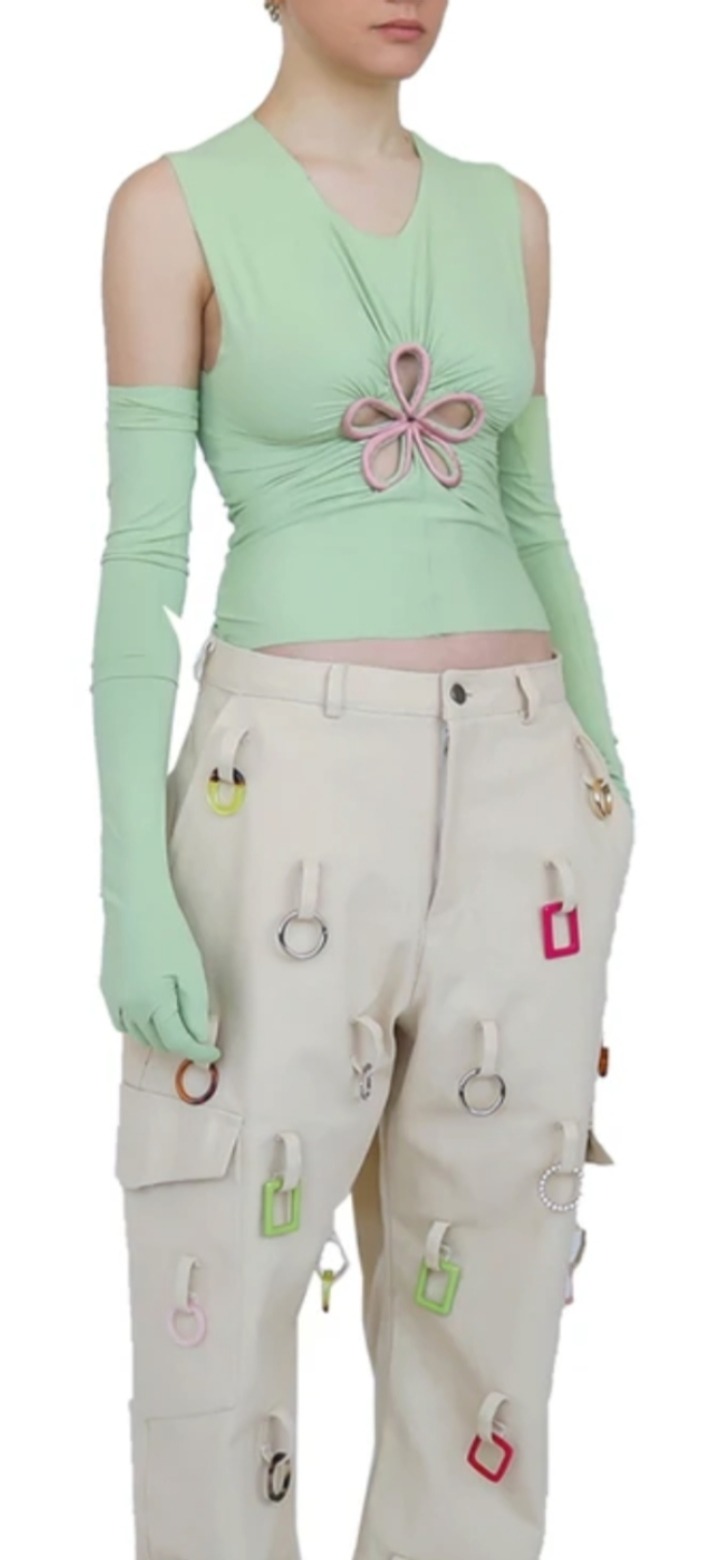
See the full post
322 notes - Posted May 18, 2022
#2

since when has he ever even tried
408 notes - Posted August 11, 2022
My #1 post of 2022
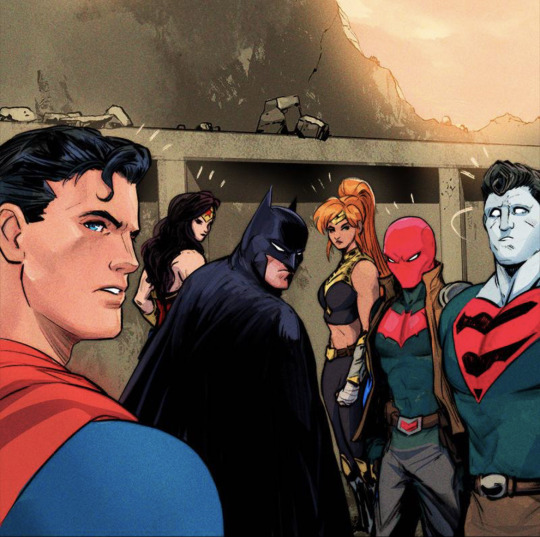

Look familiar?
1,029 notes - Posted October 5, 2022
Get your Tumblr 2022 Year in Review →
2 notes
·
View notes
Note
Hi! It's the person with France thing again. Thank you for responding. I think u are the first person that was worried about me when I told then what's happening to me. The rest of the ppl(my family and my best friend) either told me I lost my mind and started laughing or they we're like "Omg that's so cool 😍"(my best friend). I'll try to go to a psychiatrist as soon as possible but for sure that's not gonna happend very soon since I have a really busy schedule. But I'm anxious abt going to a psychiatric ward cuz I heard bad things about the one that I have in my city. It's not the first time I'll go to a psychiatric evaluation . Last time they just gave me some pills that made me feel like I was in drugs and I got addicted to them. Thanks for caring again ^^
I'm so glad that you're okay! It's horrible no one has been taking you seriously, especially since these things get worse the longer you go without treatment:/ I have bipolar1-with psychosis, so I understand what is like experiencing these sorts of things.
The good thing about psych wards is that you don't necessarily have to go to the one closest to you. If you're in a stable enough mental place, you can look up ' psychiatric hospitals near me ' and a list will come up, thanks to Google there should be reviews. Keep in mind these places aren't for luxury, so any with a 3/5 star rating is a safe bet. You can check yourself in for an evaluation directly at the psychiatric hospital :)
Medications can be difficult, for certain mental illness they are necessary to function however. Thankfully, there's a wide range of different options, so if you try one but feel the effects are too negative or it's not helping, you can tell your psychiatrist and ask to try a different medication. It took me years to find the right combination of the right medicine, but eventually I did ^-^
Personally I would recommend going to the hospital either tonight or in the morning at the latest, due to - speaking from experience - how psychosis can go from a manageable state to a complete disconnection from reality with no warning within seconds. I'm worried about you and don't want you to wind up accidentally harming yourself or something else bad happening because of a sudden full break from reality. I know it's terrifying to go, but I believe in you, you're very strong and brave for reaching out to someone to begin with, and I know you can take the next step too :) just keep taking deep breaths and drinking water. I won't lie and say the hospital will be fun, but it will keep you safe and you'll have access to professional psychiatric treatment as well as support through therapy 24/7 there. I recommend packing a few books and a lot of comfy clothes in your bag. (I've been in the psych ward before, if you can't tell lol.)
I'm so sorry that no one has been taking you seriously, I really hope that changes. I hope you're able to get the help that you need ASAP. Please know that I care about you, even though I don't know who you are, I do care and want you to be okay. I wish you the best and I'm here for you
/serious /gen
1 note
·
View note